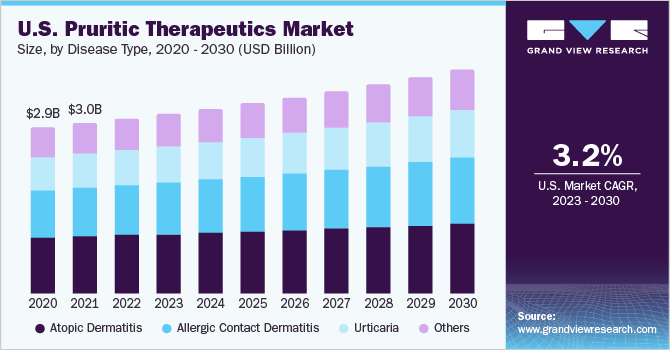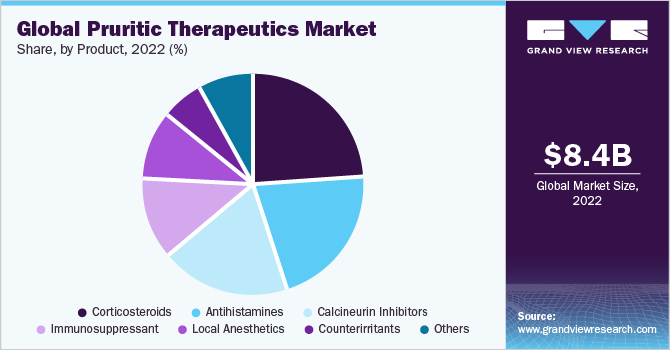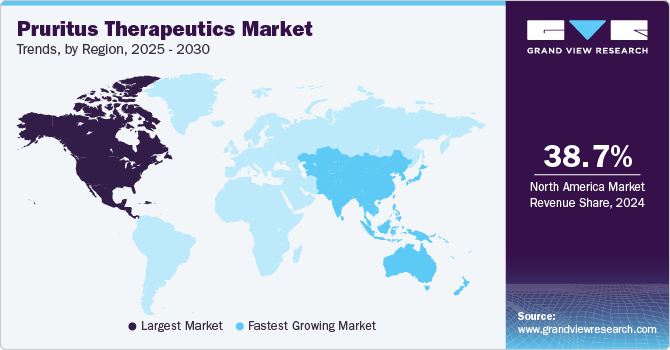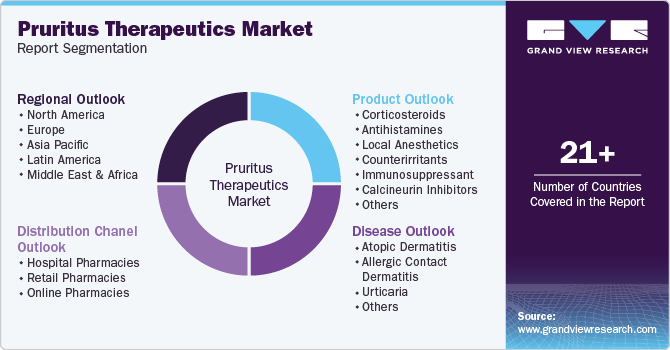- Home
- »
- Pharmaceuticals
- »
-
Pruritus Therapeutics Market Size And Share Report, 2030GVR Report cover
![Pruritus Therapeutics Market Size, Share & Trends Report]()
Pruritus Therapeutics Market Size, Share & Trends Analysis Report By Disease Type (Atopic Dermatitis, Allergic Contact Dermatitis, Urticaria), By Product (Corticosteroids, Antihistamines), By Region, And Segment Forecasts, 2023 - 2030
- Report ID: 978-1-68038-365-2
- Number of Report Pages: 80
- Format: PDF, Horizon Databook
- Historical Range: 2018 - 2021
- Forecast Period: 2023 - 2030
- Industry: Healthcare
Report Overview
The global pruritus therapeutics market size was estimated at USD 8.39 billion in 2022 and is anticipated to grow at a compound annual growth rate (CAGR) of 4.0% from 2023 to 2030. The growing prevalence of conditions associated with pruritus such as atopic dermatitis, urticaria, and psoriasis is expected to serve the market as a high-impact-rendering driver. Moreover, the presence of high unmet medical needs and the subsequent introduction of new products catering to these needs are expected to serve as future growth opportunities.

Pruritus brachialis, pruritus ani, pruritus uremic, nocturnal, and senile pruritus are types of pruritus that can affect humans and may be confined to one part of the body or may affect the whole body. Itching itself, if not too severe, can be treated by keeping the skin clean and moisturized and avoiding known allergens and scratching. Medications used to treat itching are called pruritus therapeutics. According to the National Institutes of Health, it is estimated that pruritus is a manifestation of an underlying systemic disease in approximately 10% to 25% of affected individuals.
According to the Life (Basel) Journal, in 2021, the prevalence rate of eczema in a controlled study of Swedish children was 34%. Therefore, since itch is a sequela of these skin diseases, the burden of eczema/atopic dermatitis is high, and the demand for pruritic drugs is expected to increase. In July 2021, Albireo Pharma, Inc. launched Bylvay, a drug for treating pruritus in all types of progressive familial intrahepatic cholestasis (PFIC) with the approval of the U.S. Food & Drug Administration (FDA).
Antihistamines, topical steroids, immunosuppressants, and corticosteroid creams can relieve the discomfort caused by itching. For instance, antihistamines are used to treat itching caused by allergens. Similarly, advances in the medical field have led to the discovery of new drugs that are effective in treating pruritus. In 2022, Pfizer Inc. announced CIBINQO (abrocitinib) which is an oral treatment for treating adults with atopic dermatitis. High opportunity segments such as the pruritus for psoriasis market are likely to encourage manufacturers to make modifications/additions to their existing product portfolio.
The impact of COVID-19 on the pruritus therapeutics market was initially negative due to the cancellation of elective surgeries, including the treatment of itching, which affected the market. According to an article in the Indian Journal of Clinical and Experimental Dermatology (IJCED), COVID-19 presented unique challenges for all health professionals, including dermatologists, in managing skin conditions, including the common skin condition, urticaria. However, the market began to gain momentum as market players around the world resumed treatment facilities and research and development activities to develop innovative treatments for pruritus.
Disease Type Insights
Based on disease type, the market is segmented into internal diseases, atopic dermatitis, allergic contact dermatitis, urticaria, and others. The atopic dermatitis segment held the largest revenue share of around 30.0% in 2022. Eczema or atopic dermatitis is one of the most common chronic skin diseases, often beginning in early childhood. Skin conditions may be associated with allergic rhinitis, asthma, and food allergies. Certain foods such as citrus fruits, eggs, tomatoes & milk can also cause eczema in young children. According to National Eczema Association, approximately 9.6 million U.S. children under the age of 18 have atopic dermatitis, and one-third have moderate to severe disease.
The urticaria segment is projected to grow at the fastest CAGR of more than 4.0% over the forecast period. Urticaria, or hives is a common, severely itchy skin disorder that causes red, itchy, raised bumps that are millimeters to centimeters in size. They can appear anywhere on the body and have a lifetime prevalence of approximately 20%. Most allergists prescribe antihistamines such as cetirizine, fexofenadine, and loratadine to reduce symptoms of urticaria.
Product Insights
Based on product, the market is categorized into corticosteroids, local anesthetics, counterirritants, antihistamines, calcineurin inhibitors, immunosuppressants, and others. The corticosteroids segment dominated the market with a revenue share of 24.07% in 2022. Corticosteroids are anti-inflammatory drugs and are used to provide comfort by reducing inflammation. A few corticosteroids include cortisone, dexamethasone, prednisolone, and hydrocortisone. Additionally, corticosteroids lessen allergic responses, itching, swelling, and redness. They are applied to numerous types of pruritus. Due to their wide range of uses, corticosteroids are common pruritus treatments, which accounts for their market domination.

The calcineurin inhibitors segment is anticipated to grow at a CAGR of 4.9% during the forecast period due to its strong pipeline and its high response rate. Tacrolimus is a calcineurin inhibitor that stops the immune system from reacting severely by blocking calcineurin, one of the chemicals that contributes to eczema flares.
Regional Insights
North America dominated the market and accounted for the largest revenue share of 39.9% in 2022. The introduction of new products and the presence of favorable government initiatives are some key factors attributing to its large share. Furthermore, the growing prevalence of target diseases and the presence of pruritus-inducing climatic conditions in the region are expected to drive market growth during the forecast period. According to National Eczema Association, 31.6 million people were suffering from some form of eczema, and prevalence peaks during early childhood in the U.S. in 2019.

Asia Pacific is expected to grow at the fastest CAGR of 5.2% over the forecast period due to the presence of unmet healthcare infrastructure needs and the increasing prevalence of atopic dermatitis and urticaria. According to an article published in the Indian Journal of Community Medicine (IJCM), 20% of the Indian population was suffering from skin diseases in 2020. Infections and eczema accounted for two-thirds of skin conditions in the study population.
Furthermore, favorable government initiatives pertaining to drug price adjustment and the development of new medicines for the treatment of atopic dermatitis and other dermatological conditions in regions such as Japan and Australia are anticipated to present manufacturers with lucrative future growth opportunities. For instance, in August 2022, Maruho Co., Ltd. (Japan) launched Mitchga Subcutaneous Injection 60mg Syringes, for treating itching related to atopic dermatitis. According to the WHO, China's geriatric population is expected to climb by 28% by 2040, which would assist China's pruritus therapeutics market to grow.
Key Companies & Market Share Insights
The global market comprises various players operating at regional and global levels and are engaged in extensive R&D to develop novel therapeutics, which exhibit higher efficacies. These key players are undertaking strategies including license agreements, collaborations, R&D investments, mergers and acquisitions, and partnerships to increase market penetration. As per an article published in October 2022, Regeneron Pharmaceuticals, Inc. and Sanofi’s phase 3 trial of Dupixent had a significant impact on itch in 12 weeks. In addition, Dupixent received four approvals from the FDA and generated USD 4.1 billion in 2020.
In October 2020, Cara Therapeutics and Vifor Pharma signed the U.S. license agreement for the commercialization of IV Korsuva Injection. It is a prescription medicine for treating adults undergoing hemodialysis and suffering from pruritus associated with chronic kidney disease. In January 2021, Novartis announced that the U.S. Food and Drug Administration (FDA) granted breakthrough therapy designation for the treatment of chronic spontaneous urticaria (CSU), an unpredictable and severe disease of the skin. Some prominent players in the global pruritus therapeutics market include:
-
Abbvie, Inc.
-
Actavis Plc
-
Amgen, Inc.
-
Astellas Pharma
-
Bristol-Myers Squibb
-
Cara Therapeutics
-
GlaxoSmithKline, Plc.
-
Myaln NV
-
Novartis AG
-
Pfizer Inc.
-
Sanofi
-
Teva Pharmaceuticals
Pruritus Therapeutics Market Report Scope
Report Attribute
Details
Market size value in 2023
USD 8.67 billion
Revenue forecast in 2030
USD 11.38 billion
Growth rate
CAGR of 4.0% from 2023 to 2030
Base year for estimation
2022
Historical data
2018 - 2021
Forecast period
2023 - 2030
Report updated
August 2023
Quantitative units
Revenue in USD billion, and CAGR from 2023 to 2030
Report coverage
Revenue forecast, company ranking, competitive landscape, growth factors, and trends
Segments covered
Disease type, product, region
Regional scope
North America; Europe; Asia Pacific; Latin America; MEA
Country scope
U.S.; Canada; UK; Germany; France; Italy; Spain; Denmark; Sweden; Norway; Japan; China; India; Australia; South Korea; Thailand; Brazil; Mexico; Argentina; Saudi Arabia; South Africa; UAE; Kuwait
Key companies profiled
Abbvie, Inc.; Actavis Plc; Amgen, Inc.; Astellas Pharma; Bristol-Myers Squibb; Cara Therapeutics; GlaxoSmithKline, Plc.; Myaln NV; Novartis AG; Pfizer Inc.; Sanofi; Teva Pharmaceuticals
Customization scope
Free report customization (equivalent up to 8 analyst’s working days) with purchase. Addition or alteration to country, regional & segment scope
Pricing and purchase options
Avail customized purchase options to meet your exact research needs. Explore purchase options
Global Pruritus Therapeutics Market Report Segmentation
This report forecasts revenue growth at global, regional, and country levels and analyzes the latest industry trends in each of the sub-segments from 2018 to 2030. For this study, Grand View Research has segmented the global pruritus therapeutics market report based on disease type, product, and region:

-
Disease Type Outlook (Revenue, USD Billion, 2018 - 2030)
-
Atopic Dermatitis
-
Allergic Contact Dermatitis
-
Urticaria
-
Others
-
-
Product Outlook (Revenue, USD Billion, 2018 - 2030)
-
Corticosteroids
-
Antihistamines
-
Local Anesthetics
-
Counterirritants
-
Immunosuppressant
-
Calcineurin Inhibitors
-
Others
-
-
Regional Outlook (Revenue, USD Billion, 2018 - 2030)
-
North America
-
U.S.
-
Canada
-
-
Europe
-
UK
-
Germany
-
France
-
Italy
-
Spain
-
Sweden
-
Norway
-
Denmark
-
-
Asia Pacific
-
China
-
Japan
-
India
-
Australia
-
Thailand
-
South Korea
-
-
Latin America
-
Brazil
-
Mexico
-
Argentina
-
-
Middle East and Africa
-
Saudi Arabia
-
South Africa
-
UAE
-
Kuwait
-
-
Frequently Asked Questions About This Report
b. The global pruritus therapeutics market size was estimated at USD 8.39 billion in 2022 and is expected to reach USD 8.67 billion in 2023.
b. The global pruritus therapeutics market is expected to grow at a compound annual growth rate of 4.0% from 2023 to 2030 to reach USD 11.38 billion by 2030.
b. Corticosteroids dominated the pruritus therapeutics market with a share of 24.1% in 2022. This is attributable to the increasing use of corticosteroids as the first line of treatment.
b. Some key players operating in the pruritus therapeutics market include Cara Therapeutics, Ulorac, UCB Pharma, Sanofi Aventis, Pfizer and Actavis Plc.
b. Key factors that are driving the market growth include growing prevalence of conditions associated with pruritus such as atopic dermatitis, urticaria, and psoriasis.
Share this report with your colleague or friend.
![gvr icn]()
NEED A CUSTOM REPORT?
We can customize every report - free of charge - including purchasing stand-alone sections or country-level reports, as well as offer affordable discounts for start-ups & universities. Contact us now
![Certified Icon]()
We are GDPR and CCPA compliant! Your transaction & personal information is safe and secure. For more details, please read our privacy policy.
We are committed towards customer satisfaction, and quality service.
"The quality of research they have done for us has been excellent."





